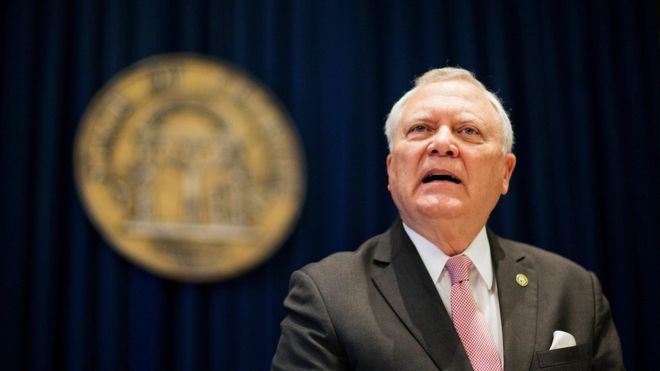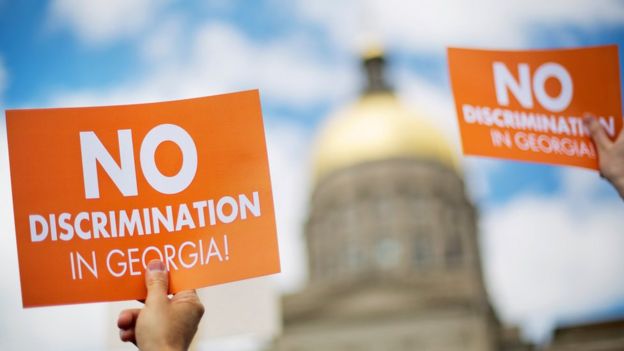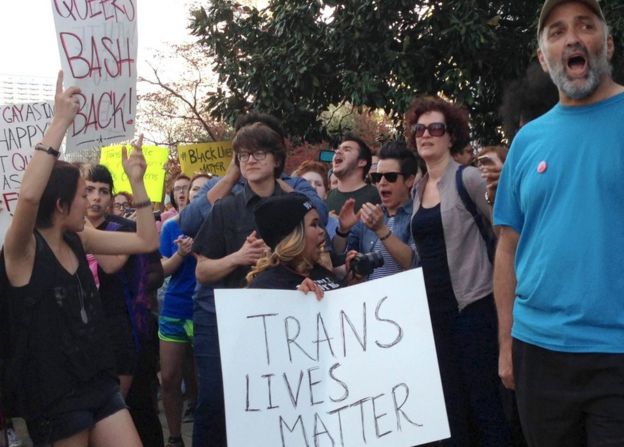
Mr Deal said Georgia does not have to discriminate to protect the religious freedom
The governor of the US state of Georgia has vetoed a "religious freedom" bill after facing pressure from business interests. The bill would have allowed faith-based organizations to refuse service to gay and transgender people.
Disney, the National Football League, Coca-Cola and others threatened to pull business out of the state. The veto comes as other US states enacted similar laws that limit gay rights.
"I believe it is a matter of character for our state," Governor Nathan Deal said.
"I do not think that we have to discriminate against anyone to protect the faith-based community in Georgia."

The bill would allow faith-based group to refuse serve to gay and transgender people
Republicans lawmakers said the bill would protect religious people who believe serving gay and transgender people violates their beliefs.
The bill also would have protected clergy not wishing to perform gay marriages, and people who would not attend weddings based on religious beliefs. If passed, opponents said it would have legalized discrimination and flattened ordinances passed to protect gay and transgender people.
Mr Deal said his decision was "about the character of our state and the character of our people. Georgia is a welcoming state; it is full of loving, kind and generous people."
The bill also would have protected clergy not wishing to perform gay marriages, and people who would not attend weddings based on religious beliefs. If passed, opponents said it would have legalized discrimination and flattened ordinances passed to protect gay and transgender people.
Mr Deal said his decision was "about the character of our state and the character of our people. Georgia is a welcoming state; it is full of loving, kind and generous people."
Disney said it would not shoot films in Georgia if the bill became law.
"Disney and Marvel are inclusive companies, and although we have had great experiences filming in Georgia, we will plan to take our business elsewhere should any legislation allowing discriminatory practices be signed into state law," a Disney spokesman told Variety last week.

AMC threatened to stop filming the hit show The Walking Dead in Georgia if the bill became law

The NFL said Georgia could miss out on hosting future Super Bowls because of the bill
Warner Bros and cable network AMC released a similar statement last week. AMC produces the hit show The Walking Dead, which is filmed in the state.
Atlanta Falcons owner Arthur Blank denounced the bill, and the National Football League said passing the bill would have hurt Atlanta's chances of hosting the Super Bowl.
"The message to Governor Nathan Deal was loud and clear: this deplorable legislation was bad for his constituents, bad for business and bad for Georgia's future," said Chad Griffin, president the Human Rights Campaign, a leading gay rights group. "Discrimination and intolerance have no place in the 21st century,"
Republican State Senator Josh McKoon said he was "disappointed" and thought Mr Deal was someone "the faith community could rely on".
After the US Supreme Court legalized same-sex marriage last year, many conservative states drew up laws in an attempt to protect the religious community.

A new law that rolls back protections for transgender people in North Carolina has led to protest
Last week, North Carolina's legislature passed a sweeping bill that bars its cities and counties from having their own anti-discrimination rules. Legislators pushed for the bill after Charlotte passed an ordinance allowing transgender people to use restrooms according to gender identity.
Lawmakers in several other US states have proposed similar legislation - sometimes referred to as "bathroom bills". The North Carolina law has also drawn criticism from the business community with Charlotte-based Bank of America, Apple and other large companies expressing concern about the law.
On Monday, a federal lawsuit was filed against the governor of North Carolina over the new law. Two transgender men along with the two civil rights groups filed the lawsuit, asking a judge to declare the law unconstitutional.
The law is unconstitutional and at the same time, in keeping with the constitution. For example:
Section 2 of the "religious freedom bill" says clergy don't have to perform same-sex marriages. You would think that was unconstitutional but the Constitution presumably already allows clergy to refuse weddings that go against their religious beliefs. However, the US Supreme Court suggested in its same-sex marriage decision, people don't need the approval of clergy to wed in Georgia.
Section 4 protects religious nonprofits from having to provide services that violate their faith, unless they agreed to do so in a contract or grant application. This could allow a religious adoption agency to, for instance, deny services to a same-sex couple without risking government interference.This part of the bill could clearly allow discrimination, although, in this example, there are big secular adoption agencies in Georgia.
Section 5 protects the rights of religious nonprofits to hire only people who support and practice their faith. This part of the bill could clearly allow discrimination.
Equally important, Georgia, like most states, doesn't have civil rights laws that would ban discrimination against sexual orientation and gender identity in the workplace, housing, and public accommodations. In these states, it's not necessarily religious freedom laws that allow discrimination; it's the lack of civil rights laws.Section 2 of the "religious freedom bill" says clergy don't have to perform same-sex marriages. You would think that was unconstitutional but the Constitution presumably already allows clergy to refuse weddings that go against their religious beliefs. However, the US Supreme Court suggested in its same-sex marriage decision, people don't need the approval of clergy to wed in Georgia.
No comments:
Post a Comment
Through this ever open gate
None come too early
None too late
Thanks for dropping in ... the PICs